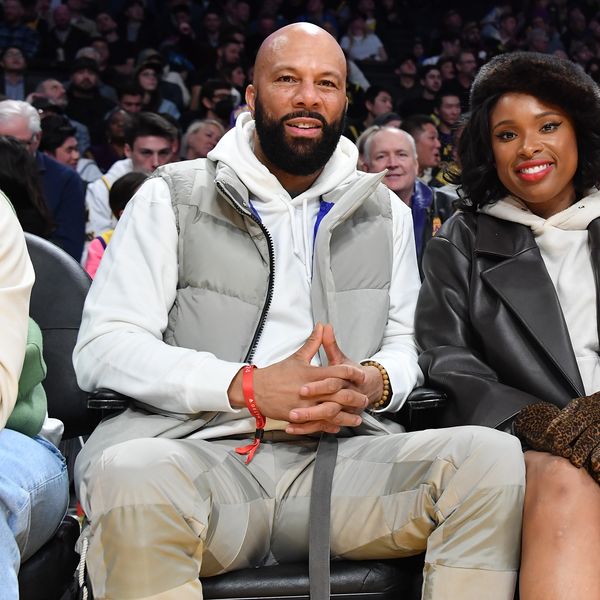
Ayesha Curry Says It's ‘Been A Journey’ In Becoming Confident Within Herself
Self-confidence is something that many people struggle with in their life, whether it’s due to societal pressures to meet a certain beauty standard or lifestyle or the constant comparison to others.
Despite the causes surrounding the issues with self-confidence, numerous ways exist to improve it. According to Medical News Today, several steps include having compassion for oneself, incorporating some form of self-care into a daily routine, and zeroing in on the positive aspects of one's life.
One person that could relate to a couple of these points is Ayesha Curry. From the outside looking in, Curry has it all, from a successful career as a best-selling author and restaurant owner, and a doting family. The 34-year-old is married to Golden Warriors point guard Steph Curry, and the couple shares three children.
In a recent interview with People magazine, Curry opened up about the road to accepting herself while promoting her new partnership with Square.
The star revealed to the publication that although she may appear to have it all together, her self-confidence had wavered "from time to time" like most people.
Curry said she combatted those feelings by accepting who she was as a person and "letting go" of the expectations others had set for her.
"I think confidence is something we all struggle with from time to time. It's definitely been a journey for me," she said. "A big part of that journey was letting go of other people's expectations and embracing my own uniqueness."
While the mother of three didn't disclose the exact reason behind the lack of self-confidence she experienced, many can assume it could be due to the pressures of maintaining the perfect image of a woman of faith, a mother, having a famous husband, and the attention he gets from the opposite sex, which she once mentioned in the past.
Regardless of the matter, it is excellent to see Curry walking in her truth and inspiring others to do the same.
Let’s make things inbox official! Sign up for the xoNecole newsletter for daily love, wellness, career, and exclusive content delivered straight to your inbox.
Feature image by Miikka Skaffari/Getty Images
This article is sponsored by Hulu.
UnPrisonedhas returned for its highly anticipated second season, delving deeper into the complex dynamics of the Alexander family.
The series premiere comes a year after its debut season garnered rave reviews from fans and critics and earned record-breaking ratings for Hulu's Onyx Collective brand. UnPrisoned's success can be attributed to its raw, relatable themes and comedic appeal.
Inspired by creator Tracy McMillan's life, the show follows Paige (Kerry Washington), a therapist and single mother whose life takes an unexpected turn when her father, Edwin (Delroy Lindo) --who was released from prison-- moves in with her and her teenage son, Finn (Faly Rakotohavana).
Throughout UnPrisoned's first season, viewers witnessed how Edwin's incarceration deeply affected Paige's life and relationships. In the series, Paige unpacks her trauma through interactions with her inner child and her online followers. Meanwhile, Edwin is overcoming specific struggles with his own past that led to his life of crime, including a dysfunctional upbringing and his mother's arrest. As the Alexanders attempt to reconcile, new challenges arise.
This new season promises to further explore their unconventional family dynamic. Here are several compelling reasons why season two of UnPrisoned should be on everyone's watchlist.
The Alexander Family Life Is Still In Shambles
UnPrisoned's second season resumes where the series left off, with Paige grappling with the fallout from her troubled therapy practice and Edwin navigating life independently after moving out. Meanwhile, Finn faces his own challenges. The teenager is battling anxiety and seeking information about his father—a topic Paige avoids discussing.
The Alexander Family Are Attending Therapy To Resolve Their Underlying Issues
Amid the chaos in their lives, the Alexander family decides to mend their bond by confronting their past traumas. They seek professional help and attend therapy sessions with a “family radical healing coach,” played by John Stamos, a new cast member. This collective effort aims to unravel the complexities of their shared history and strengthen their relationships.
The process of unraveling each character's internal conflicts and their potential impact on future relationships may clash with Paige's textbook therapy approach. While Paige is used to being in the therapist's seat in both career and family, this forces her into the unfamiliar role of a patient during therapy sessions. This shift would compel her to look in the mirror and try a radically different approach.
The Alexander Family Learned A Big Lesson During A Therapy Session
In therapy, the Alexanders are tasked with addressing their individual traumas to salvage their remaining relationships. One of the family therapist’s eccentric suggestions was an exercise involving a family wrestling match. During this session, Paige faces tough questions about her refusal to share information about Finn's father.
While it's unclear whether this scene is reality or fantasy, the image of the family duking it out in the ring certainly makes for hilarious yet compelling television.
Paige Tries Dating Again Following Failed Relationships
Amid her life's chaos, Paige decides to step back into the dating field. However, her many attempts have left her with mixed results. The dating apps have turned out to be a fail, and an outing with her ex Mal (Marque Richardson), who is also her father's parole officer, doesn’t go quite as expected after he brings an unexpected guest – his new girlfriend.
The situation takes an awkward turn when Mal's new partner learns why the former couple split, partly due to Paige's self-sabotage.
UnPrisoned Is A Perfect Balance Of Comedy And Drama
As a dramedy, UnPrisoned takes a comedic approach to its heavy subjects. The show takes us on a ride with Paige's dating misadventures and navigating a friendship with her ex.
Other lighthearted moments include Edwin's attempts at CPR based on online videos and, of course, the antics of the Alexander family's unconventional new healing coach.
The second season of UnPrisoned is now available on Hulu.
UnPrisoned | Season 2 Trailer | Hulu
Feature image courtesy
Blair Underwood Initially Turned Down 'Sex And The City' Because 'It Was About How Samantha Was Fascinated By Dating A Black Man’
Actor and heartthrob Blair Underwood is opening up about why he turned down Sex and the City the first time he was offered a role. Many fans of the HBO series may recall Blair's time on the show in which his character was dating Miranda (Cynthia Nixon). However, he was previously offered another role where his character would date Samantha (Kim Cattrall).
During his interview with AV Club, the Set It Off star revealed that he was uncomfortable with the initial offer due to the character's fascination with him being a Black man.
“I actually did say ‘no’ the first time,” he said. “The first time they had offered the role, to be honest with you, it was about how Samantha was fascinated by dating a Black man and wanted to know if, uh, all of the rumors were true about our anatomy! And I said, ‘Listen, I’m honored, thank you, but I just don’t want to play a character based on race, on curiosity about a Black man.'”
But that didn't stop them from reaching out again. This time he was offered to play Dr. Robert Leeds, the love interest to Miranda and he decided to go for it. "So they were nice enough to call about a year later, and I said, 'Well, is it gonna be about race?' And they said, 'No, no, no, we’re not even gonna mention race!' And I think it really did only come up maybe once," he recalled.
"It did five episodes, and I think Samantha mentioned it once, saying something about 'a Black doctor' that Miranda was dating. And that’s really been a consistent thing in my career: not wanting to be boxed as 'the Black guy.'
"I’ve had that conversation with many producers along the way, and they were so great. They said, 'No, he’s just a doctor who Miranda meets in the elevator, and they have a nice little fling.' And it was amazing."
Blair has had a wide-ranging career playing everything from a lawyer on L.A. Law to playing Madame CJ Walker's husband on Self Made: Inspired by the Life of Madame CJ Walker. And during his interview, he revealed another role that he initially turned down, Set It Off. The movie, which is considered a classic in Black culture, stars Queen Latifah, Jada Pinkett Smith, Vivica A. Fox, and Kimberly Elise. Blair's character, Keith, played a banker and love interest to Jada's character, Stony.
He explained why he said no at first and eventually accepted the offer. "I had initially said “no” to that. Because I was playing this historic, iconic African-American historical figure in Jackie Robinson, and the time, y’know, there was Boyz N The Hood, and Menace II Society was out there, and I’d finished playing this noble Negro… [Laughs]," he said.
"And I’m reading the script, and there’s a scene where Jada Pinkett’s character—Jada Pinkett-Smith now—was going to sell her body so she could make some money to send her brother to college. And I remember, honestly, I threw the script across the room. I was, like, “I don’t want to do this. I want to do something uplifting for the Black culture and Black characters, and I don’t know if I want to see this.”
After a conversation with the movie's director F. Gary Gray and the actor's manager encouraging him to finish reading the script, Blair had a change of heart. What he first thought about the movie turned out to be totally different.
"So I finished the script, and I saw that the character they were asking me to play was really the love story in the midst of all of this turmoil of all of these characters, the four ladies: Queen Latifah, Vivica Fox, Kimberly Elise, and Jada," he explained.
"It was so well-written, it was such a great platform for them. And to be able to play the love story and the storyline that gave Jada’s character a leg up and a way out of this world, something to hope for, to wish for, someone to love her… I said, 'You know what? I’d like to be a part of that.'
"And I’m so glad I did, because that film resonates to this day. People all the time come up to me and say that they love that movie. So I’m glad that I did it."









